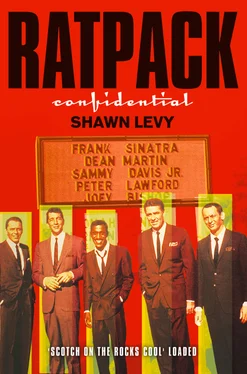Frank, for one, took notice.
Through the dusty haze kicked up by his killing schedule, Frank had begun to set his sights on something higher than mere success as a singer, actor, or even mogul.
He had always seen himself as a representative man, a “little guy” whose ascent in the world was a vindication of his parents’ immigration to America and his own combative resiliency in overcoming ethnic prejudice, loneliness, and, if you could call it that, economic privation. It wasn’t enough for a guy like that to simply be busy at his job—Sammy, say, was at least as active. No, he had to have an impact on the world.
So in 1958, when it looked like this handsome young senator from Massachusetts, Jack Kennedy, would make a bid for the presidency, Frank decided to become part of it the way he did everything else he was passionate about: both hands, feetfirst, no looking back.
It was a sign of his own success. Into his forties, he had come to see himself as a man of station and discernment, a world-beater worthy of helping shape the future. But it was also a kind of inheritance: He had learned about politics by watching his mother work the ward system in Hoboken. Dolly Sinatra had the barest formal education and should’ve been kept from achieving any kind of power as a woman, an immigrant, as a midwife and abortionist. But she had spunk: She married a Sicilian against her Genoese parents’ will; she dressed up like a man to watch her husband box in men-only joints; she exploited her fair features to pass herself off as Irish; she drank; and she talked like a stevedore, cursing vividly even when, in her dotage, attended constantly by a nun.
Such spirit distinguished her from other Italian mothers of her generation, but not so dramatically as did her political activities. In a corrupt little town run by an ironclad political machine, she won over the kingmakers by consistently turning out the vote and becoming the person to whom her neighbors came for jobs, food, and the sort of generic wheel-greasing and ass-saving they associated with Men of Respect. Dolly, of course, could never hold office, but she had the ears of men who could forgive crimes, erase debts, grant sinecures, and make life bearable or hellish as they chose. With her assistance, scores of Hoboken’s Italians made their way toward the better life they’d come to America to enjoy.
Dolly didn’t achieve her station simply by virtue of gumption. She worked hard at her glad-handing and ward-heeling, and she was even willing to broker her only child for political advantage; as his godfather, she chose none of his five uncles or other male relatives but Frank Garrick, an Irish newspaperman whose uncle was a police captain. The choice proved strangely fateful. In a mix-up that marked the child forever, the priest at the baptism named the boy Francis—for Garrick, whom he somehow came to believe was the father—instead of Martin, the name Dolly and Marty had chosen. Dolly, still recuperating from the delivery, wasn’t at the ceremony to protest, while Marty stood there in characteristically mute impotence, saying nothing as his patrimony was diluted.
For all that she fussed over her boy, for all the clothes and spending cash and good words put in with people who could get him jobs and, later, gigs, Dolly nevertheless found it more exigent to leave him to the care of others and pursue her political work. Frank was fobbed off on relatives and neighbors. Politics, in effect, was the sibling from whose charms he could never divert his mother’s eye; naturally, it came to seem to him an extension of family life, a way of linking up with his absent mother and creating a community around himself.
Plus it had perks. Dolly got Marty a well-paying job in the city fire department despite his inability to pass a written test, and she eventually got him promoted to captain—though few of his colleagues reckoned him worthy of the honor. Comfort and largesse flowed from political power, Frank could see, and when he was old enough to court it he did.
Frank’s political instincts weren’t entirely mercenary. He genuinely felt compassion for the underdog and championed civil rights as soon as he had a platform from which to be heard. In 1945, virtually the moment his career as a solo artist granted him a public profile, he spoke out against prejudice at a high school in Gary, Indiana, where black students had recently been admitted to a hostile reception from whites.
He also godfathered a curious little film project, The House I Live In , a ten-minute docudrama in which he preached a lesson in ethnic harmony to a mixed-race gang of street kids. “Look, fellas, religion makes no difference except to a Nazi or somebody as stupid,” he explained. “My dad came from Italy, but I’m an American. Should I hate your father ’cause he came from Ireland or France or Russia? Wouldn’t that make me a first-class fathead?” Then he launched into the title song, a syrupy ode to American equality, and ended by admonishing his audience of converted Schweitzers, “Don’t let ’em make suckers out of you.” (The film won Special Academy Awards for its creators, including Sinatra, director Mervyn LeRoy, and screenwriter Albert Maltz, a future member of the famous Hollywood Ten group of blacklisted authors.)
And Frank practiced what he preached. He was among the earliest and most visible proponents of civil rights in all of show business. He worked and traveled with black musicians, always insisting that they get treatment equal to that afforded him in restaurants and hotels, and he did what he could to give a boost to such acts as the Will Mastin Trio.
Frank’s political liberalism even led him to a deliberate reprise of the accident that gave him his own name. His only son was always known as Frank Jr., but the kid was actually named Franklin Wayne Emmanuel Sinatra in tribute to, among others, his father’s hero Franklin Roosevelt.
And he didn’t merely communicate his convictions in symbols. On the night in 1944 that FDR beat Thomas Dewey, Frank, in New York for a series of concerts at the Waldorf-Astoria, celebrated with a bar crawl in the company of Orson Welles. The two decided to cap their gambols by razzing right-wing columnist Westbrook Pegler, also resident at the hotel. They rowdily pounded the door to Pegler’s suite to no satisfactory response, then returned, discouraged, to their debauch.
Four years later, Frank won $25,000 on a bet that Harry Truman would be reelected. In 1952, Frank campaigned for Adlai Stevenson, and then again in 1956, when he sang the national anthem at the opening session of the Democratic National Convention in Chicago and stuck around to get a close-up look at the action. (He caused some of his own as well. After he sang “The Star-Spangled Banner,” Frank was on his way offstage when he was grabbed by Speaker of the House Sam Rayburn, who asked him if he’d also be performing “The Yellow Rose of Texas.” “Get your hands off the suit, creep,” Sinatra replied.)
It was there that his eye was first caught by Jack Kennedy, then a dazzling, photogenic young senator with a pretty wife and a baby on the way. After Stevenson had secured the presidential nomination, he’d thrown the vice-presidential slot to the convention without naming a candidate of his preference; Kennedy, against his father’s wishes, sought the spot and was locked in battle for it with Tennessee’s Mafia-baiting senator, Estes Kefauver. Frank hung close to the Kennedys as the convention progressed, impressed with the amount of money and degree of organization the family applied to the campaign. When Kefauver won the nomination, the Kennedys were briefly stunned.
Then Frank noticed Bobby, the senator’s younger brother and campaign manager, telling folks around him, “OK, that’s it. Now we go to work for the next one.” The stubborn will in those words was invitingly familiar, an echo of Dolly’s gumption. Frank determined to keep tabs on Jack Kennedy.
Читать дальше












